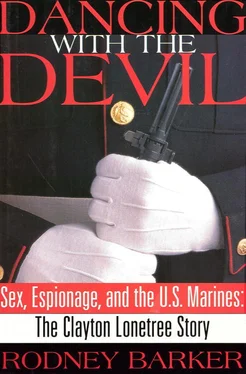The evening she received a phone call telling her that a military court had found Clayton guilty of espionage and sentenced him to thirty years in prison, she was devastated. Until then she had held out the hope that some miracle would happen that would scale down the dimensions of this tragedy.
For the first time she became really scared. If what they had done together had brought such a terrible fate to him, that started her thinking that perhaps something equally awful was meant for her. Would the KGB blame her for the failure of the operation? she wondered.
She was crying softly when she called her mother into her room and broke the news that Clayton had been sentenced to prison. And then, in a voice so low Genrietta could barely hear her, Violetta said, “Mama, if something bad happens to me, I want you to promise that you will do something for me.”
Genrietta protested, “Veta, don’t talk like that.”
“Please, Mama. Promise me.”
Tears welling, Genrietta asked her daughter what it was she wanted her to do.
“I want you to bury me in the dress that Clayton gave me.”
Genrietta knew what dress she was talking about. Clayton had given it and a bottle of perfume to Violetta as a gift. It was a black-and-white-checked dress, made of wool with a white collar, and it hung in Violetta’s wardrobe beside the two white dress shirts he had also given her. Although she had yet to wear it out, she would put it on for special family occasions because, she said, it made her feel closer to Clayton.
“If that is your wish,” Genrietta replied.
In the days that followed, Violetta entered a depression that seemed bottomless. She was unable to sleep, so she stayed up all night smoking cigarettes and drinking wine and listening to foreign broadcasts on the radio on the chance they would have something new to report about Clayton. Finally, as the dawn lightened her window, she would fall asleep, only to rise late in the day, fix herself something to eat, and return to her room. She was silent, sullen, and unresponsive, and on the rare occasions she shared her feelings, she would frequently speak about death.
“I’m not afraid to die,” she said on one occasion. “To me it’s one and the same as life.”
When she talked like this, Genrietta was at a loss. She wanted desperately to help her daughter through this difficult period, but Violetta could not be comforted. Genrietta now believed that if harm came to Violetta, it would not be instigated by the KGB but by Violetta herself. On those occasions when her depression seemed dangerous, Genrietta would call her friends and they would take turns coming over and keeping a suicide watch through a particularly hard night.
It pained Genrietta to see her daughter let herself go like this, ignore her appearance, and indulge in unhealthy habits, and around the house she tried to maintain an upbeat attitude, hoping it would brighten Violetta’s mood. But nothing seemed to work. A doctor said she was suffering from a nervous breakdown, but when the days turned into weeks, the weeks added up to months, and still Violetta remained in her room, reading, watching TV, listening to the radio, smoking, and drinking herself into a stupor, it was apparent that this was more than an illness: Violetta seemed almost to have given up on life itself.
It wasn’t until she had a late-night breakthrough conversation with her daughter that Genrietta understood what was going on. As Violetta explained it, even though she believed that anyone in her place would have made the same decisions she had, and even though Clayton had understood the implications and risks inherent in their relationship, she knew that he’d done what he had to keep their relationship going, and she felt such regret and guilt and personal responsibility for his misfortunes that she had to find a way to stay faithful to him. She did not believe there was anything she could do to help him get out of prison, so she had sworn before his memory that as long as he was in prison, she would never marry, she would never have a child, and she would confine herself to her room because it was the closest she could come to sharing a cell with him.
A year passed, then another, and Violetta honored her vows, bearing the burden of her grief in lonely privacy like someone under a decree of eternal damnation. Outwardly the circumstances of her life continued to resemble Clayton’s in an uncanny way, as her self-imposed sentence of solitary confinement remained inviolate. Inwardly, she had no way of knowing how he was feeling—for all she knew he was bitter and thought of her as his betrayer, not his beloved. But every day she looked at the picture of him standing in Red Square and recalled his parting words, “Whatever happens, I will come back for you.” And when the day did come that he was a free man again, whether he returned to her or not, she knew in her heart that she would be able to say, “I too have served time in prison, I have made peace with myself, and my soul is clean before you.”
Clayton Lonetree’s legal appeals were handled by a Washington, D.C., attorney who had been part of the military team that investigated the 1968 My Lai massacre, which led to the conviction of Lt. William Calley, Jr., for participation in the murder of 102 unarmed Vietnamese civilians. Lee Calligaro, a congenial, chain-smoking, forty-five-year-old, had become Lonetree’s attorney when Lawrence Cohen, a longtime acquaintance of his, phased out his involvement to become a judge in St. Paul. Although his specialty was in the health-care field, he took the case because he had a background in military law and he liked to have at least one pro bono case going on at a time. Before he’d even read the trial transcript, based solely on his reading of the news accounts, he had concluded that the court-martial had been conducted in such a way as to exaggerate public fears, which, in turn, had led to an unfair and excessive sentence.
Calligaro took a decidedly less contentious approach than that adopted by Lonetree’s former civilian attorneys, who had repeatedly criticized the military justice system before, during, and after the court-martial. Believing that the military was basically fair and well suited to correcting mistakes, and working closely with a bright appellate military defense counsel, Lt. Comdr. Lou Saccoccio, who was a graduate of Harvard Law School, he prepared a brief that argued that a number of serious legal errors had been committed in the court-martial. But there were three areas in particular that they felt held the greatest promise for a retrial, reversal, or reduction in sentence.
The first was the one that Stuhff and Kunstler had banked so heavily on: that Lonetree had been promised confidentiality in connection with the statements he gave to the CIA, and therefore those statements should not have been used against him at trial. The second was that Lonetree’s Sixth Amendment rights were violated when his attorneys were denied the right to fully cross-examine the pseudonymous witness, John Doe. And the third was that Lonetree had been ineffectively represented by his civilian counsel, who ignored plea-bargaining overtures so they could continue the case as a forum for publicity to further their own political agendas.
The appeal was filed in mid-1989 with the U.S. Navy-Marine Corps Court of Military Review (CMR), which was made up of nine military officers, Marine Corps colonels and Navy captains, people who for the most part had spent twenty years as lawyers. Delays piled up, so it was a year before the CMR rendered its decision, which was a virtual strikeout for the appellate team. The CMR judges wrote that when Lonetree approached the CIA in Vienna he “knowingly stepped outside of his military chain of command,” the Agency’s debriefings had been conducted for its own damage-assessment purposes and were entirely independent of the military’s criminal investigation, and “the two sets of investigators were at all times fulfilling their own unique duties and that neither side became the agent of the other.”
Читать дальше












